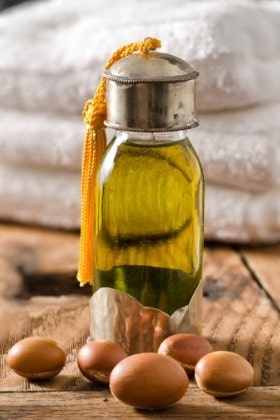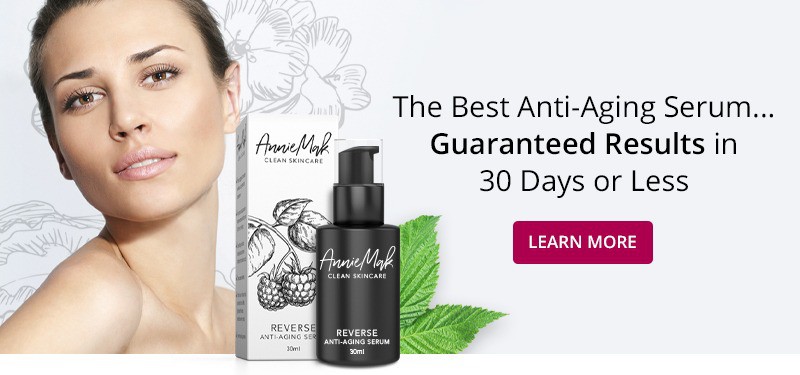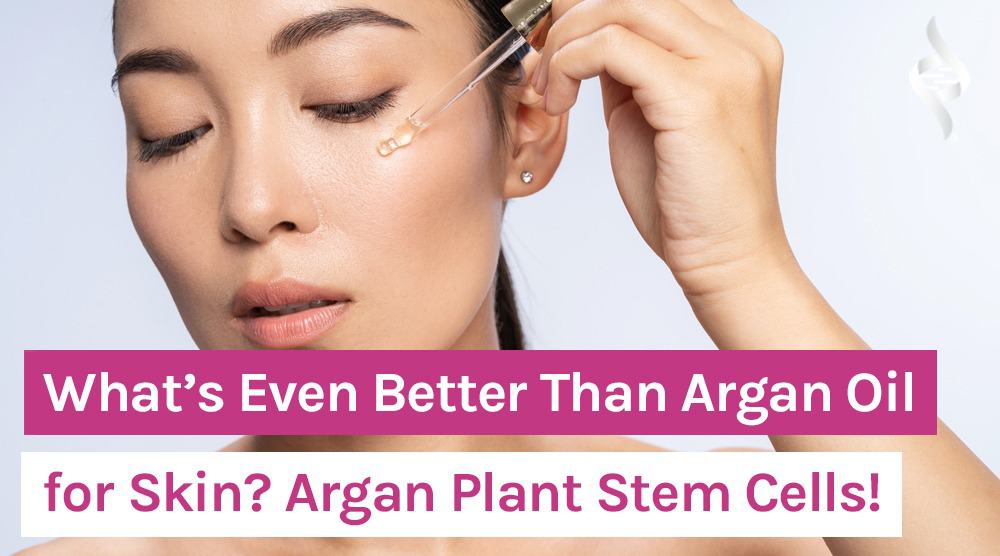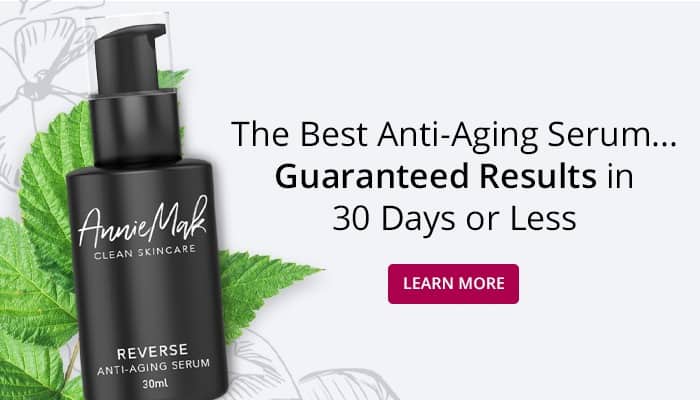What’s Even Better Than Argan Oil for Skin? Argan Plant Stem Cells!
Of the countless natural substances that can nourish and revitalize the skin, argan oil is one standout that has stood the test of time. Now science has combined the healing power of argan with the revitalizing effects of plant stem cell technology. The resultant argan stem cells are a new and improved way to get glowing, beautiful, age-defying skin!
What Is Argan Oil?
Argan (Argania spinosa) is a tree native to Morocco that produces a sweet fruit. The fruit is not what argan oil cultivators are after, however. Their prize is the seed or nut found inside of the fruit.
Argan oil, which is made from this nut, is amazing for more than just the skin and hair. It can also be a pricey addition to gourmet menus since it’s edible and excellent for internal health. In fact, it has been used for millennia for inflammatory conditions [1].
The fruit of the argan tree is a real treat for local goats too. Why would we mention this? Read on to find out the surprising role that goats play in argan oil production.
How Is Argan Oil Made? (and What Do Goats Have to Do With it?)
In modern times there have, of course, been questionable processing mechanisms developed by manufacturers wanting to produce large amounts of the pricey oil at the expense of quality. Luckily, most nuts today are still collected and pressed by hand, as they have for thousands of years.
Although argan trees are not particularly large trees, the fruit often grows on high branches – too high for argan oil makers (who are mostly women) to collect easily. This is where the goats come in.

Goats are very nimble and able to climb up the trees. They eat the fruit and “expel” the seeds. Then the women come by and simply collect the seeds.
Don’t worry, it’s not as bad as you may be thinking. According to a study conducted by researcher Ahmed El Aich of the Hassan II Agronomic and Veterinary Institute in Rabat, Morocco, approximately 60% of all argan oil pressed in that country comes from nuts that are spat out whole (not expelled at the other end, as is popularly believed) [2].
In addition, argan nuts are encased in a thick outer shell that keeps goat saliva (or anything else, for that matter) from contaminating them prior to being shelled.
As an interesting aside, while many people have tried to grow argan trees elsewhere, to this day the only place they grow is the southeastern part of this small, African country.
Since 1998, the argan forests of southwestern Morocco have been declared a biosphere reserve by UNESCO [3]. This is good news since the highest quality oil comes from small-batch producers who have cultivated and processed argan oil the same way for centuries.
Argan Oil Benefits for Skin
There are many reasons why argan oil in general can be so nourishing for both skin and hair. First of all, argan oil is rich in vitamin E. Its this vitamin E content which makes it such a great moisturizer for the face, soaking in and sealing moisture without leaving skin feeling greasy or waxy.
Argan Oil Offers Protection From the Harsh Rays of the Sun

Vitamin E is also an antioxidant. It and other antioxidant substances, such as tocopherols, help make argan oil a substance that can protect skin from the most harmful rays of the sun. Moroccans, especially Moroccan women, have been using argan oil for centuries as a protectant against the brutal Saharan sun.
A 2013 study published in the journal Evidence-Based Complementary Alternative Medicine found that argan oil use led to a “dose-dependent decrease in melanin content.” This study found that argan oil protects against free radical damage and may also inhibit protein factors that are key in the growth of melanoma cancer cells [4].
Argan Is Rich in Essential Fatty Acids
Argan nuts are also rich in essential fatty acids, which is also good news for your skin. Research has confirmed that consuming healthy amounts of the “good” kinds of fats (or applying them topically) can help to reduce sun sensitivity and inflammatory responses associated with skin conditions such as acne.
Other investigations have shown that essential fatty acids can help with psoriasis. Of course, essential fatty acid intake has also been associated with internal health as well. They can help lower your risk of heart disease and stroke, alleviate pain associated with inflammation, and can help to balance neurological conditions [5].
The combined effects of all the skin-healthy substances in argan oil results in skin tissue that is more supple, yet at the same time stronger than ever. This is why argan helps with scarring and can hasten wound healing.
Another Moroccan study conducted in 2015 on postmenopausal women found that those who used argan oil externally had a significant increase in skin elasticity, compared with those who did not use argan oil [6].
Why Argan Plant Stem Cells Are an Even More Potent Form of Argan
In recent years, another form of argan has been discovered that takes the moisturizing, protecting, and nourishing components found in regular argan oil to the next level. This is known as argan sprout cell extract or argan stem cells.

What makes plant stem cells so beneficial for human health? To understand this, it’s helpful to discuss what a stem cell is first. Regular cells are “programmed” for one particular function, whether that is to create skin tissue or blood plasma.
Stem cells, however, are essentially “blank slates” and are designed to go wherever they’re needed most. They’re created “unprogrammed” and are sometimes called “source cells.” When they’re needed for new growth somewhere in the body, or in this case, in skin tissue, they simply “become” that type of cell, acting as a replacement for specific tissue cells.
How Do Plant Stem Cells Differ From Animal Stem Cells?
Both animals and plants create stem cells. There’s one big difference between them, however. The stem cells in animals naturally succumb to the aging process over time just like any other cell. In human skin, for example, this means that skin stem cells will become less effective as a person ages, and thus less able to support collagen production.
Plant stem cells, on the other hand, are exempt from the aging process. They will consistently contain the ability for self-renewal, even under less than ideal conditions or environmental stress.
Science is constantly discovering more about how important plant stem cells are for human health. The authors of a German study conducted at Heidelberg University explain:
“[I]t has gone almost unnoticed that plant stem cells represent the ultimate origin of much of the food we eat, the oxygen we breathe, as well the fuels we burn. Thus, plant stem cells may be ranked among the most important cells for human well-being [7].”
Some experts have found that plant stem cells can sometimes contain up to 1,000 times the beneficial effects (such as antioxidants) of regular plant extracts [8]. What’s even more incredible is what plant stem cells may be able to do for human skin cells.

A report published in the SOFW Journal found that when small amounts of plant stem cells are used (in a skincare formula, for example), they can act like young human skin stem cells and are able to help increase collagen synthesis [9].
All this can translate into more photoprotection (protection from sun damage), more moisture retention, and less wrinkling and sagging for your skin.
Argan Stem Cells and Your Skin Health
Argan oil has been used for thousands of years amongst people in Morocco for skin protection and revitalization as well as for help with inflammation and for overall health. It has a proven track record throughout history.
Now research shows that argan stem cells are able to penetrate past the dermis level of the skin to provide protection and support at deeper levels than many other plant-derived stem cell types [10].
Organixx Skin: Reverse Anti-Aging Serum contains argan stem cells that work at deep levels for optimum protection and support. Argan stem cells within Reverse also work synergistically with other key ingredients such as raspberry seed, cranberry seed, and tremella mushroom extract to protect, nourish, fortify, and replenish the skin.
Reverse Anti-Aging Serum penetrates beyond the skin’s surface and works at a cellular level to keep skin hydrated and radiant while minimizing wrinkle depth and appearance.






Comments